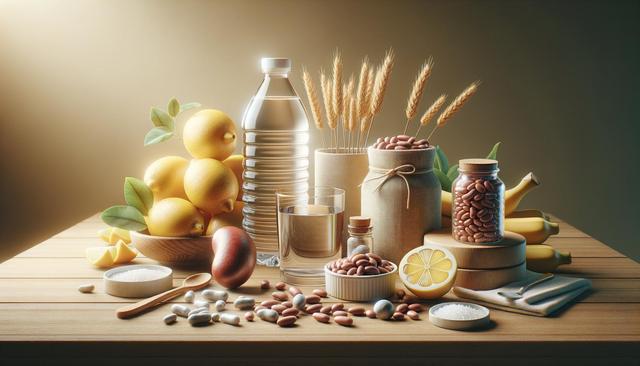What Are Kidney Stones and Why Diet Matters
Kidney stones are hard deposits that form in the kidneys when minerals and salts crystallize in the urine. These stones can vary in size and cause significant discomfort, often resulting in sharp pain, nausea, and urinary issues. One of the key factors contributing to kidney stone formation is diet. Certain foods can increase the likelihood of stone development, while others can help prevent their formation. By understanding which foods to include and avoid, individuals can take proactive steps in managing their kidney health.
The most common types of kidney stones include calcium oxalate, uric acid, struvite, and cystine stones. Each type may require a slightly different dietary approach. However, some general guidelines are beneficial for most individuals. Staying well-hydrated is crucial, as it helps dilute substances in the urine that lead to stones. Aiming for at least 2 to 3 liters of water a day is often recommended. Additionally, reducing sodium intake and moderating animal protein consumption can significantly lower the risk of developing stones.
Recommended Foods for Kidney Stone Prevention
Choosing the right foods plays a vital role in preventing kidney stones from forming. A diet rich in certain fruits, vegetables, and whole grains can help maintain a healthy urinary tract and reduce the concentration of stone-forming minerals. Here are some food categories that are generally helpful:
- Fruits high in citrate, such as lemons and oranges, which help prevent stone formation
- Calcium-rich foods like yogurt and leafy greens, which can bind to oxalate in the gut and reduce its absorption
- Low-oxalate vegetables, including cabbage, cauliflower, and cucumbers
- Whole grains that support digestion and reduce urinary calcium levels
It’s equally important to limit foods high in oxalate (such as spinach, beets, and almonds), as well as sugary drinks and excessive salt. Moderation is key, and working with a healthcare provider or dietitian can help tailor a diet that meets individual needs while minimizing the risk of kidney stones.
Natural Home Remedies to Support Kidney Health
In addition to dietary changes, several home remedies may support kidney function and help in flushing out small stones. These remedies are often used as preventive measures or to ease mild symptoms. While they are not substitutes for medical treatment, they can complement other strategies in managing kidney stones.
- Lemon juice mixed with warm water can increase citrate levels in urine, helping to dissolve small stones
- Apple cider vinegar, when diluted in water, may help break down stones due to its acidic properties
- Basil tea is believed to balance uric acid levels and support overall kidney health
- Hydration with natural diuretics like coconut water or herbal teas can aid in flushing out toxins
Before trying any home remedy, it’s important to consult a healthcare professional, especially if there is an existing medical condition or ongoing treatment. These remedies are generally safe when used responsibly and can be a valuable part of a kidney-friendly lifestyle.
Foods and Habits to Avoid
Just as some foods can help prevent kidney stones, others can increase the risk. Those prone to stones should be mindful of dietary choices that can trigger or worsen the condition. Key items to avoid include:
- High-oxalate foods such as rhubarb, chocolate, and sweet potatoes
- Excessive intake of animal protein, which increases uric acid levels
- High-sodium foods like processed snacks, canned soups, and fast food
- Sugary drinks and sodas that contribute to dehydration and mineral imbalance
In addition to food choices, certain lifestyle habits can impact kidney health. For instance, sedentary behavior and lack of physical activity may affect metabolic health and increase stone formation. Smoking and high alcohol consumption are also known to negatively impact kidney function. Developing consistent, healthy habits can be just as important as dietary adjustments in maintaining long-term kidney wellness.
When to Seek Medical Attention
While diet and home remedies can provide significant relief and prevention, there are times when medical intervention is necessary. If kidney stones are large, recurrent, or causing severe symptoms like blood in urine or intense pain, professional evaluation is essential. Delaying treatment in such cases can lead to complications such as infections or kidney damage.
Some signs that warrant immediate medical attention include:
- Persistent pain in the lower back or abdomen
- Fever, chills, or signs of infection
- Difficulty or pain during urination
- Visible blood in the urine
In such cases, healthcare providers may recommend imaging tests, medication, or surgical procedures to remove the stones. Preventive strategies, including dietary changes and natural remedies, are most effective when used in combination with professional care and regular health check-ups.
Conclusion: Supporting Kidney Health with Smart Choices
Kidney stones can be a painful and recurring issue, but with the right approach to diet and home care, many individuals can manage their condition effectively. Emphasizing hydration, incorporating kidney-friendly foods, and using natural remedies can go a long way in promoting urinary health. It’s also crucial to avoid harmful dietary habits and recognize when medical support is needed. By making informed and consistent choices, individuals can reduce the risk of kidney stones and support their overall well-being.


